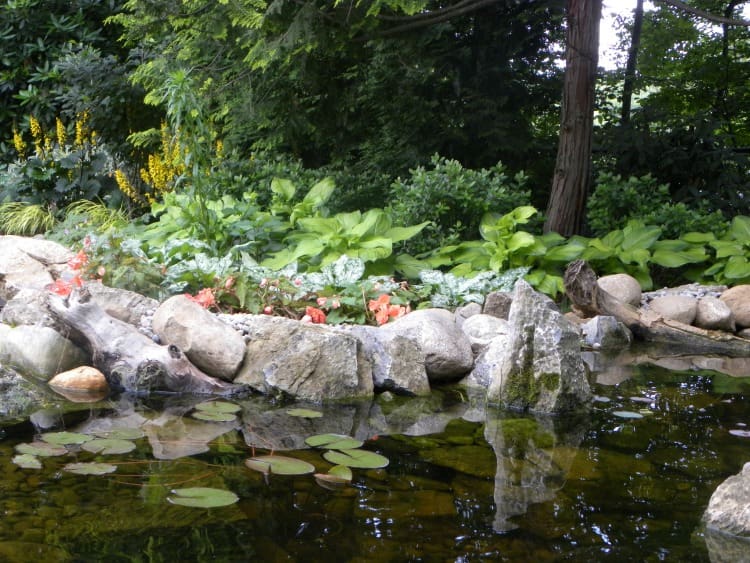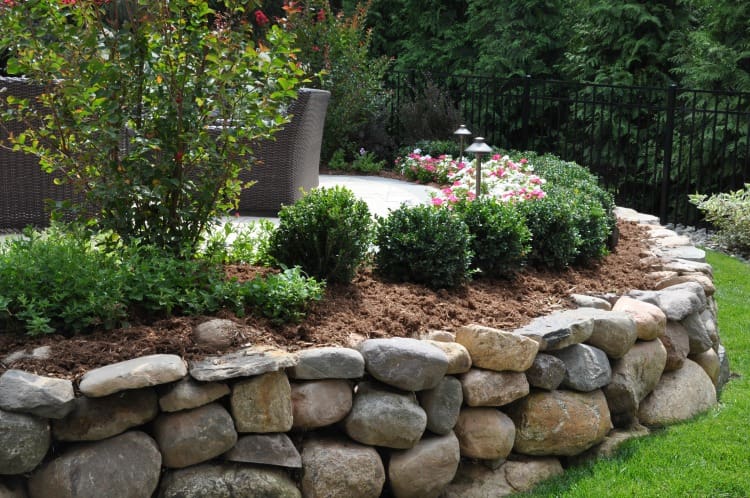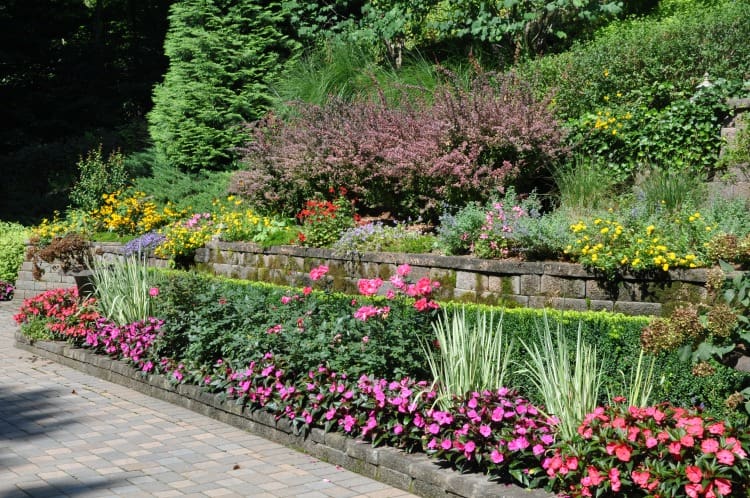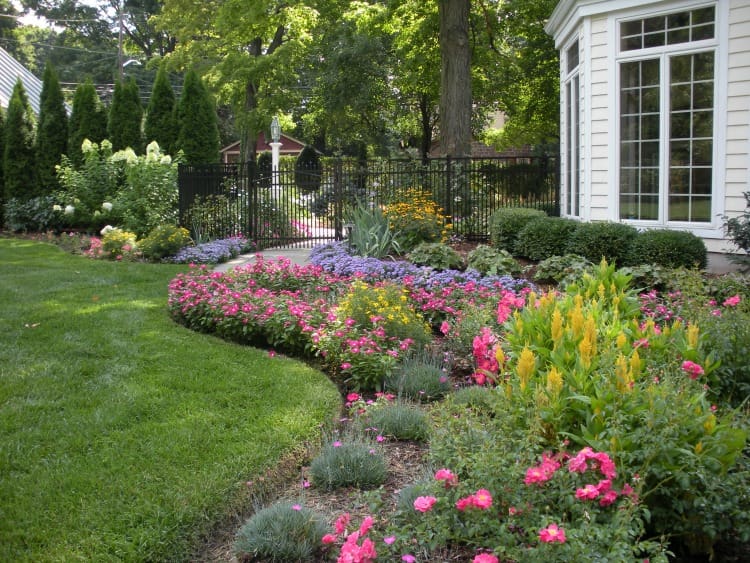Hiring a landscape professional to handle your Bergen County landscape needs will provide numerous advantages for your home. In addition to being educated and experienced in horticulture and lawn care and maintenance requirements, landscape architects in NJ have extensive design and construction knowledge. By hiring a landscape architect, you can benefit from a variety of skills. Take a look at some valuable benefits that a landscape architect can provide.
Lawn and Garden Renovations
Landscape architects in NJ can provide lawn and garden renovations to repair existing damage or simply give your home a fresh, new landscape design. Whether you need to remove dead or damaged trees, prune ornamental trees and shrubs, re-seed or re-sod your lawn or create beautiful garden areas, a landscape architect can handle the job. Lawn and landscape renovations can enhance the beauty of your landscape, increase the value of your home and significantly boost your home’s curb appeal.
Experienced garden designers can fill your landscape with colorful flowers, lush, green foliage and fragrant scents to create an inviting outdoor ambiance. They can create beautiful annual and perennial flower gardens, specialty gardens that attract butterflies, birds and wildlife, tranquil zen gardens for meditation and healthy edible gardens full of fresh fruits, vegetables and herbs. Garden designers can also create beautiful window boxes, seasonal displays and potted arrangements for your porch and patio areas.
Soil Testing
When the soil warms up, it’s important to do a soil test to determine the pH balance. The type of soil you have, acid or alkaline, will have a big impact on your lawn and landscape growth and maintenance requirements. Sandy soils drain quickly and don’t hold moisture or nutrients well. Clay soils hold a lot of nutrients, but don’t let air or water penetrate. Landscape architects in NJ can test your existing soil to make sure it’s adequate for the type of grass and plants you have in your landscape. If nutrients or a different type of soil mixture is needed, your landscape architect can add required elements to make the soil richer and more fertile for healthy grass and plant growth.
Lawn Aeration
Lawn aeration is a process that creates small holes in the soil to reduce soil compaction and allow oxygen and water to reach grass roots. Northern New Jersey has harsh winters with freezing temperatures and snow and ice. When this occurs, the ground freezes and causes the soil to become hard and compacted. Lawn aeration will break up hardened soil, so grass roots can store necessary nutrients, air and water to produce healthy, new green grown in the spring. Aerating your lawn can be done with hand tools, but it’s slow, tedious and less effective that using aeration equipment. For best results, it’s best to leave lawn aeration to a landscape architect in NJ with aeration knowledge, proper skills and professional equipment.
Organic Lawn Care
Landscape architects in Bergen County, like Borst Landscape & Design, offer organic lawn and landscape care for your home. Organic lawn care and tree care provides a safe chemical-free environment for your family and pets and promotes a healthy environment that’s free from harmful chemicals and toxic gasses in the atmosphere.
Unlike traditional over-the-counter products like fertilizers, herbicides and pesticides, organic lawn care products help to create a natural process that promotes aeration, root growth, fertile soil and healthy, green foliage without chemicals. Organic ingredients help to establish an environmentally friendly lawn and landscape. Organic nutrients improve soil conditions and promote healthy insects like earthworms, while discouraging harmful insects and outdoor pests that can cause damage. Organic lawn care is a great way to keep your lawn and landscape plants green and healthy and your kids and pets safe year-round. For best results, organic lawn, shrub and tree care and maintenance should include spring, summer and fall applications.
Outdoor Pest Control
Although insects and outdoor pests are common in every landscape, some can cause significant lawn and landscape damage. Small, hard-to-see insects like mealybugs, aphids, caterpillars and beetles can invade your lawn, and underground pests like slugs, fire ants, grubs and wire worms can invade your soil. These insects and outdoor pests can cause lawn diseases that result in yellow or brown spots, bare patches and dead grass in your lawn, as well as damage to foliage on plants, shrubs and trees.
NJ landscape architects can provide an Integrated Pest Management Program (IPM) as a way to prevent unwanted insects and pests in your lawn and landscape. An Integrated Pest Management Program uses natural, organic herbicides and pesticides that help to change the natural balance in your landscape and provide a safe, year-round solution for outdoor pest control. An IPM typically includes:
- Regular inspections of your property by a specialist who will check for insects and diseases.
- Regular reports that let you know if problems exists.
- Regular reports that recommend specific treatments for problems.
Outdoor Walkways and Pathways
Hardscaping with outdoor walkways and pathways can add texture, color and visual interest to your landscape. You can create an inviting entrance to your home, a convenient pathway to the pool and spa or a romantic pathway to an outdoor garden. Hard surface materials like concrete, natural stone, brick, tile and flagstone create wonderful contrast against lush, green grass and foliage when installed in any lawn or landscape.
Landscape architects in NJ can design outdoor walkways and pathways in a variety of sizes, shapes and materials. Depending on the landscape location, they can create long, winding pathways lined with plants and flowers or short, straight walkways leading to your front door. Outdoor walkways and pathways can be built in subtle materials and colors that blend naturally into your landscape or bold patterns and colors that provide interest and contrast.
Water Gardens and Ponds

If you love nature and want a pond with organic appeal, consider a natural water garden. Water gardens are designed to blend naturally into the landscape. They are often designed in organic or free-form shapes and surrounded by rocks, stones or boulders. Typically filled with a variety of aquatic plants that attract birds, bees, frogs and wildlife, water gardens create a natural balance underwater that promotes plant growth and healthy micro-organisms. Due to an organic environment, water gardens provide a natural water source that adds beauty to the landscape and requires very little maintenance. They work especially well in casual landscapes and garden areas.
Outdoor ponds require more maintenance than water gardens, especially if they contain Koi fish. Outdoor ponds can be designed in any size and shape, in-ground or above-ground, but they do require pump and filtration systems. If you add Koi fish, your pond will need to conform to specific size, depth and water volume regulation. Koi fish often live for 20 years or more and grow to several feet in length.
Waterfalls and Fountains
Outdoor waterfalls and fountains will create relaxing atmosphere and a stunning focal point in your lawn or landscape, as well as irrigation for trees, shrubs, plants and grass. You can build a natural rock waterfall in a corner of the yard, against a fence, or near the patio for soothing water sounds. For drama and soft ambiance after dark, add lighting to draw attention to your waterfall or fountain. To conserve water and save money, talk to your landscape architect about adding a pump that recirculates water continuously or connects to some type of irrigation system for your landscape.
Retaining Walls

Retaining walls are often necessary to stabilize sloping landscapes and prevent soil erosion. Landscape architects in NJ have the construction knowledge and technical skills to build retaining walls that are strong enough to hold back the force of moving soil and keep the ground from moving and shifting. Retaining walls must be built to a certain height and contain adequate holes to allow ground water to escape and relieve pressure that builds up against the wall. If the retaining wall is built improperly, you could end up with a wall of dirt or mud in your yards, swimming pool or house.
Retaining walls can be constructed using concrete, stone, or wood, but it’s best to work with a qualified professional who can determine the best material for your existing landscape conditions. A licensed landscape architect can examine soil conditions and suggest the strongest material and type of construction for the project.
If you want a healthy, green lawn and landscape year-round, it’s best to hire a qualified, experienced landscape professional. Talk to the team of professionals at Borst who can help you with all of your Bergen County lawn and landscape needs.



